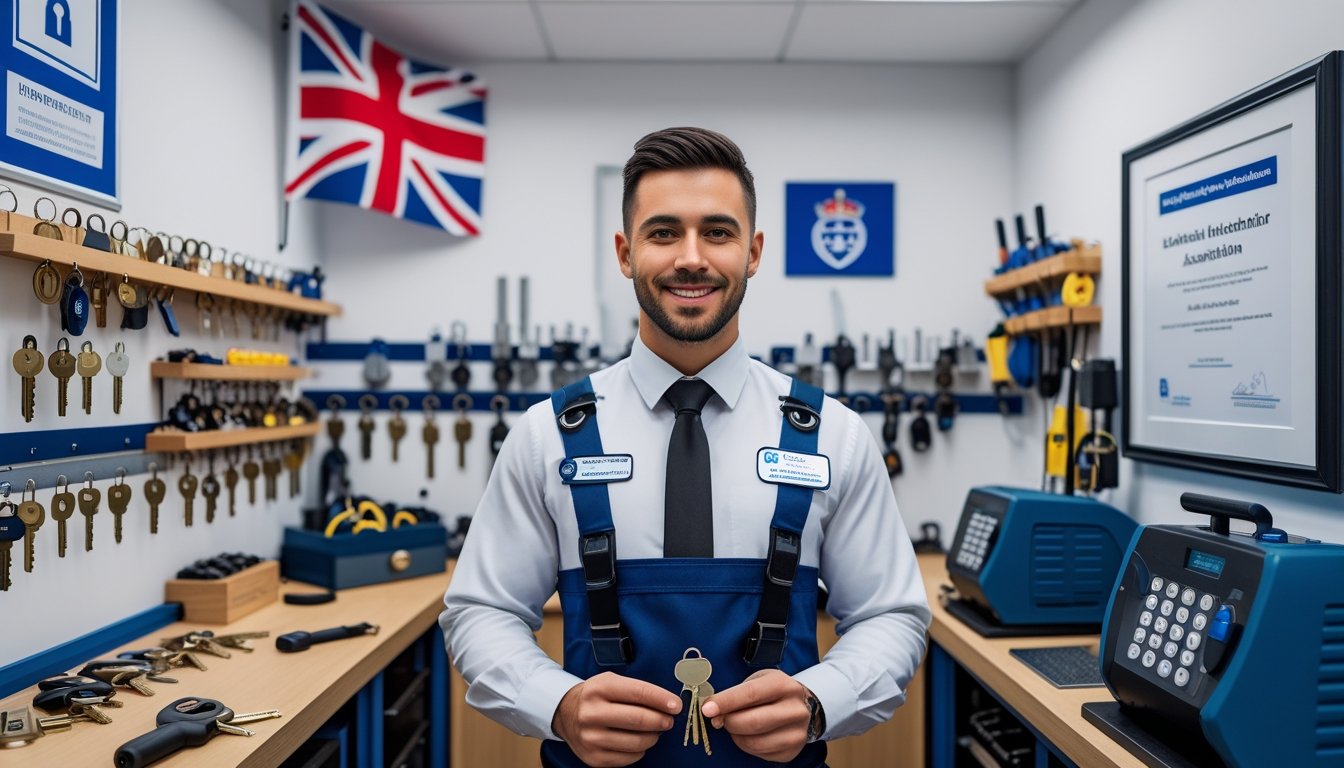Late updated: 08 Jun 2025 09:06
Written by: Elena Prescott
Importance Of Locksmith Associations In The UK: Enhancing Industry Standards and Trust
In an era where security concerns are paramount, the role of locksmith associations in the UK cannot be overstated. These organisations help maintain industry standards, ensuring the public that trained professionals oversee their security needs. The Master Locksmiths Association (MLA) stands out as a pivotal entity, setting high standards and providing oversight to locksmiths across the country. This assurance of competence and integrity brings peace of mind to countless homeowners and businesses.

As members of these respected associations, locksmiths gain access to a wealth of resources and training that keep them ahead in a rapidly evolving industry. These associations administer rigorous vetting processes, which ensure that only the most qualified individuals enter the field. By promoting excellence and adherence to strict ethical guidelines, these associations elevate the overall standards of the locksmith industry.
The impact of reputable locksmith associations extends beyond the assurance of quality services. They also serve as advocates, providing a unified voice in discussions regarding trade practices and regulations. Engaging with professional locksmith associations helps both consumers and locksmiths navigate the complexities of security needs in today’s world.
Key Takeaways
- Locksmith associations ensure high standards in the UK.
- The MLA provides oversight and rigorous vetting for locksmiths.
- Associations act as advocates for industry practices.
Overview of Locksmith Associations in the UK
Locksmith associations in the UK are vital for maintaining high standards of professionalism and skills in the industry. The Master Locksmiths Association (MLA) stands out as a prominent body that ensures robust accreditation standards, fostering trust in certified locksmiths across the country.
Role of the Master Locksmiths Association
The Master Locksmiths Association is the leading trade association for locksmiths in the UK. It plays a crucial role in setting industry standards and acts as an authoritative voice for security and ethics. As a non-profit organisation, the MLA focuses on promoting skills that build consumer trust in locksmith services. By offering training, certifications, and a platform for sharing industry knowledge, the association supports its members with resources needed to excel in their trade.
Membership and Accreditation Standards
MLA membership is highly regarded as a mark of excellence in locksmithing. The association has stringent criteria that must be met to become an accredited member. These include proof of competency, adherence to a strict code of conduct, and regular inspections of locksmith practices. Accreditation through the MLA assures customers of reliable and professional service, setting high standards for all who operate under its umbrella. This rigorous process helps maintain the credibility and trustworthiness of UK locksmiths.
Certified and Trusted UK Locksmiths
Trust in locksmith services is paramount, and the MLA ensures that its certified locksmiths are trustworthy and skilled. Only MLA approved locksmiths undergo comprehensive vetting and assessment, ensuring they meet the safety and professionalism expected in the field. This certification distinguishes them from others, offering peace of mind to clients seeking secure locksmithing solutions. With a network of vetted and reliable professionals, the MLA plays a critical role in safeguarding the interests of consumers across the UK.
The value of certified locksmiths extends beyond technical skills, encompassing the ethical standards upheld by the association. Through these efforts, the MLA continues to enhance the reputation and quality of UK locksmith services.
Benefits and Impact of Locksmith Associations

Locksmith associations in the UK play a crucial role in enhancing the skills and reputation of locksmiths. They provide a framework for professional standards, safeguard consumer interests, and contribute to the security landscape through training and regulations.
Professionalism and Industry Standards
By setting stringent industry standards, locksmith associations elevate professionalism within the locksmith industry. Regular vetting processes and background checks ensure that members adhere to a high level of ethics and competence. This standardisation encourages trust between locksmiths and clients.
Professional codes of conduct are established, guiding business practices and maintaining integrity. The recognition of these standards across the industry also results in better service quality. Ultimately, this enhances the reputation and reliability of locksmith services, promoting the trust of the community.
Security and Peace of Mind
Associations provide security by ensuring their members are highly skilled and trustworthy. With the Master Locksmiths Association (MLA), for example, rigorous scrutiny of locksmiths ensures adherence to safety protocols. This gives clients peace of mind when hiring services for their home or business security needs.
Additionally, the involvement of such associations in public security discussions heightens awareness and implementation of best practices. The protection afforded by a vetted and reliable locksmith service reduces anxiety around security issues, reassuring clients of their choice.
Training, Education, and Industry Developments
Training and education are pivotal, with associations like the MLA actively facilitating locksmith training courses. These courses cover essential skills and keep members updated on industry developments. Regular workshops and events such as the MLA Expo provide platforms for new education and innovation.
By imparting expertise to both newcomers and seasoned locksmiths, these associations contribute to continuous professional development. This focus on education elevates the skill level within the industry, ensuring that locksmiths remain competent and equipped to handle evolving challenges.
Consumer Protection and Complaints Procedures
Locksmith associations act as guardians for consumer protection. They provide guidelines and advice to help consumers make informed choices when hiring locksmiths. This support is crucial in a market sometimes marred by scammers and rogue traders, which the associations actively work to counter.
Clear complaints procedures ensure that any issues raised by customers are dealt with promptly and fairly. This transparency and accountability bolster the credibility of locksmith services. With associations leading these efforts, consumers can be more confident in their engagements with trusted locksmiths.
Frequently Asked Questions

Locksmith associations in the UK play a critical role in maintaining professional standards and offering numerous benefits to members. They ensure qualified service, regulate practices, and address the industry’s evolving demands.
What are the benefits of joining a Master Locksmiths Association?
Joining a Master Locksmiths Association offers numerous benefits, including enhanced credibility and professional development opportunities. Members can participate in training courses, access technical resources, and gain reassurances from the association's vetting process.
How can one become a certified locksmith in the United Kingdom?
To become a certified locksmith in the UK, individuals typically need to complete training courses provided by recognised associations or training centres. These programmes cover essential skills and best practices. They often include both theoretical knowledge and practical experience.
In what ways do locksmith associations in the UK regulate the industry?
Locksmith associations in the UK regulate the industry by enforcing rigorous standards for membership. This regulation often involves background checks, adherence to a code of conduct, and regular training assessments. They protect consumers by ensuring that only trustworthy professionals are endorsed.
What is the current demand for locksmith services in the United Kingdom?
The demand for locksmith services in the UK remains steady, driven by ongoing needs for security solutions and emergency services. While demand can fluctuate based on economic factors, there is a consistent need for reliable locksmith services throughout urban and rural areas.
What are the qualifications required to obtain membership in a National Locksmith Association?
Obtaining membership in a National Locksmith Association typically requires professional training completion, a background check, and demonstrated competence. Additionally, members must adhere to the association's ethical standards and continuous education requirements to maintain their membership status.
How much can a professional locksmith expect to earn in the UK?
A professional locksmith in the UK can expect to earn an annual income that varies widely depending on experience, location, and specialisation. On average, locksmiths may earn between £20,000 and £50,000 per year, with potential for higher earnings in specialised fields or successful independent businesses.
